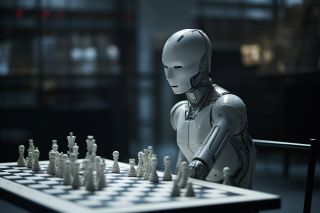Artificial Intelligence
AI and the Cumulative Effects of "Trauma"
Your capacity to navigate life depends on your data input and processing tools.
Posted August 9, 2023 Reviewed by Hara Estroff Marano
Key points
- AI and the human brain both function based on what is loaded into them.
- Your capacity to navigate life depends on the quality of data and the "algorithm" loaded into your brain.
- Poor data or inept processing skills create ongoing and progressive dysfunctional thoughts and behaviours.
- Your "trauma story" is not fixed in print. It is a dynamic state that you have a choice in directing.
There are striking similarities between the computer-based learning called artificial intelligence (AI) and the human brain. AI has the capacity to process sensory input, analyze it, and arrive at conclusions as well as make decisions. There are also marked differences: AI cannot react to internal sensations created by the body’s physiology (body’s chemistry and function), because there are no neurochemical support systems for AI.
Every living creature reacts to its environment by collecting sensory input, analyzing it millisecond by millisecond, and sending out signals to regulate the state of its physiology (how the body functions), whether it's perceiving “threat” or “safety.” The internal sensations are called “interoception,” and interpreting the signals is the basis for the evolution of human consciousness.1 Emotions reflect the feelings generated by your physiological state.
Thoughts created by your brain are also interpreted by the nervous system as input. Unpleasant thoughts may not only be perceived as a threat, you cannot escape from them. That puts your body is in a sustained state of flight or fight, which keeps your whole body fired up. Without adequate time to rest and regenerate, your body breaks down, which causes chronic illness and disease.
AI processes electronic signals but cannot "feel" a sense of threat or safety; and it also doesn't suffer from chronic illnesses. It can create art that elicits emotions, altering physiology in humans, but another AI machine observing the same art will be unable to “feel” anything.
AI vs. your brain
But here is the real problem with the human condition that is highlighted by AI. The effectiveness of AI depends on two core factors. The first being the quality of the data input and, second, the the algorithm, or “rules” of processing the data.

If you simply download the rules of chess into AI without any strategies of how to use it, nothing of significance will happen. For AI to develop a mastery of chess, the data and the approaches need to be “taught” by chess masters. Then it can analyze the approaches, mistakes, good moves, and eventually become a better player than any master.
What if you inputted the wrong rules or you trained it with someone who, like me, really knows only the rules and can see only one or two moves ahead? There is little or no chance of the computer gaining enough experience to compete at a high level, much less become a grand master. The computer can improve on good and also enhance incompetence.
In the business world, inputting bad data into AI costs industry a lot of money. AI is developing tools and approached to understand when bad data is being gathered and when the results are not going in the right direction. Could it salvage my chess game someday? Maybe.
The human database
The skill that each of us needs to learn is living an “enjoyable life”. There are two basic aspects: one, efficiently and effectively processing adversity, and, two, nurturing joy. But what is being downloaded into our brains is often a lot of dysfunctional behaviors. And then the “rules,” or algorithms, for dealing with stress become limited or simply wrong.
In his book Livewired, neuroscientist David Eagleman describes the incredible neuroplasticity of the human brain.2 It will adapt to almost any input to optimize your chance of survival. But what he describes so well is how dependent we are on our parents for physical survival. compared to most mammals. Our consciousness takes a long time to develop, and abstract thinking doesn't fully evolve until our early 20s.
We are programmed every second from birth by sensory input from inside and outside of us. We are who everyone else thinks we should be, and eventually their voices become our own. There is an almost infinite number of data points in our “database,” and much of it is the result of molding our “identity”, behaviors, accomplishments, and surviving. Additionally, most of us are not taught effective coping skills, and even fewer are taught to nurture joy.

All a child needs from his family is to feel and be safe, become educated, taught relationship skills, and feel nurtured. That’s it. That is not what many of us get. So, the download in our brains from birth is usually “flawed data.” We are not taught to process it well, we are too busy surviving to feel safe, and we don’t have the skills to nurture creativity. So, our life trajectory may continue to spiral out of control. Consider the extreme scenario of being raised in an abusive environment with damaging input and dysfunctional coping skills.
The real trauma story
There is a trend to develop a “trauma” story, a summation of your entire challenging life to which your “personal AI” continues to add dimensions and depth. But depending on what “data” has been loaded into it, you may be rapidly evolving in the wrong direction This is especially the case if your “processing system” is also flawed. The misdevelopment is ongoing until you become aware of the nature of the data contained in your brain up to this second and you learn more effective methods to process it.
There is good news: Your trauma story is not indelible. By changing the nature of your input and "processing system", you can program in any reality you wish from this moment on. The exciting aspect of the remarkable neuroplasticity of your brain is that not only will your brain evolve in the direction of your choice, with full engagement, it can happen relatively quickly. To have a good life, you must live a good life. It requires skills, practice and taking full responsibility for every aspect of it.
References
1. Damasio, Antonio. Feeling and Knowing: Making Minds Conscious. Vintage Press, 2022.
2. Eagleman, David. Livewired. Canongate Books, 2021.




